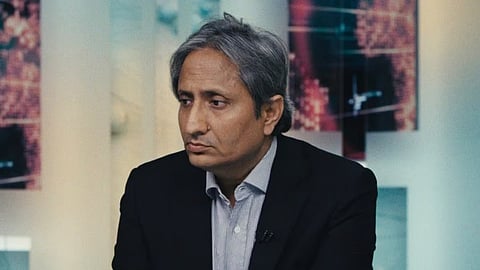

What is the cost of speaking truth to power? Vinay Shukla’s evocative documentary, While We Watched (streaming on Mubi), offers a glimpse into the life of journalist Ravish Kumar, working in the newsroom as the world crumbles around him. It gives a compelling account of the tumultuous time in his life as he battled misinformation and fake news with steely resilience. Looking back at the film, though, Ravish feels it has certain drawbacks.
The romantic in him would have wanted a stunning opening sequence, with a song playing over. “Vinay should have at least included a Rekha Bhardwaj song, written by Varun Grover,” he smiles. How does he want to be seen on screen then? “I hope someone makes a film on me where I can put on some makeup before the camera rolls and set my hair properly with stylish black shades over my eyes,” he says.
In this conversation with CE, Vinay and Ravish talk about what the film means to them, how Ravish developed his reporting style, if he ever thought about giving up while facing threats and backlash, and more.
What does the film mean to the two of you as a subject and as a maker?
Ravish Kumar: I look at the film as an archive of our times. What Vinay has recorded is not just my story. It is a representative story of all the journalists who faced a difficult time in the past ten years. It allows the audience to get a glimpse into the life of a journalist. They get to know how we are just a bunch of people working from a small room with our old computers and don’t lead a lavish life. They are able to see the darkness that surrounds our life which hopefully changes their perception about us.
Vinay Shukla: As for me, I wanted to make a film that helped people see how I see the world. Now, when people watch the film, they tell me how they didn’t know that all of this was happening at NDTV and to Ravish. They were very surprised. I wanted to question the way everyone thought about a journalist and try to find more commonalities between us in a time where we are constantly feeling more isolated and divided as a society.
Vinay, one thing that stands out in the film is the storytelling. It is not didactic. There is no voiceover. You are not asking Ravish any questions but just following him as he goes about his life. How did you come up with this approach?
VS: There were different reasons. Ravish has already had a dialogue with his own audience for the past 25 years. So, while making the film, I never had this misunderstanding that I had some great questions to ask him. So, my approach was just to sit beside him and watch him work. It slowly takes you into Ravish’s life, his office, and his family. You meet everyone around him. That’s where the cinematic approach came from.
Ravish, you have a certain poetic way of doing your reports. Did you consciously develop this style of reporting?
RK (smiles): I am not the kind of poet that you think I am. Sometimes, I listen to a lot of good songs and wish that I had written them. I think everyone has their own way of saying things which makes it stand out. In my reports, I refer to several stories done by other journalists and credit them for their work. It creates a sense of collective. I can say proudly that there is nothing “exclusive” or “breaking” in my work.
Sometimes in your reports, you use certain words like ‘Godi media’ to refer to all the channels manipulating facts. Do you think by using such terms you won't be able to have a dialogue with those who watch these channels?
RK: What kind of dialogue can happen with them? I mean, they are threatening me, abusing me every day. What do I say to them? My manner of speaking is also a process of nudging those who are watching me. This is also a way of dialogue, where I ask them to assist me. Also, I don’t feel there are two sides to the media today. Look at the empire of ‘Godi media’. How big is it? How many anchors are there? How many owners are there? They have an army of thousands of reporters and the entire market and government give them advertisements. In front of that, people like me are almost insignificant. You can't compare a lake to an ocean.
Vinay, while making the film for more than two years, did you ever have moments of self-doubt?
VS: There were some. For instance, I knew that I would be able to give the film a tangible form but I wasn’t sure if that would work. I was disappointed in people for consuming popular media. I remember feeling sad because everyone around me was consuming fabricated news, including my own family and friends. That restlessness, however, has reduced after the release of the film. People have seen it and have spoken to me about it with a lot of sensitivity. Everyone is reacting to it with a certain understanding.
Ravish, all this while you have been facing threats and backlash, did you ever think of giving up?
RK: I think of it every day. Even back then, I would start my day by saying, ‘Ab bahut hogaya' (It’s too much now). But when I type in the first word on the screen, I feel as though nothing has happened. The doubt is important as well because the moment you start thinking of yourself as God, then it gets very difficult. The daily strife of working is something that keeps you humble. Feelings of sorrow are important for you to realise what hope is.